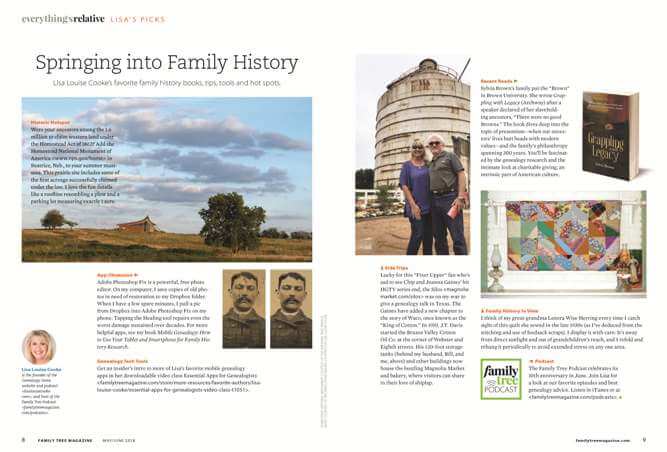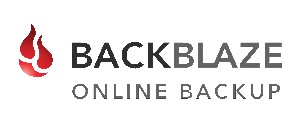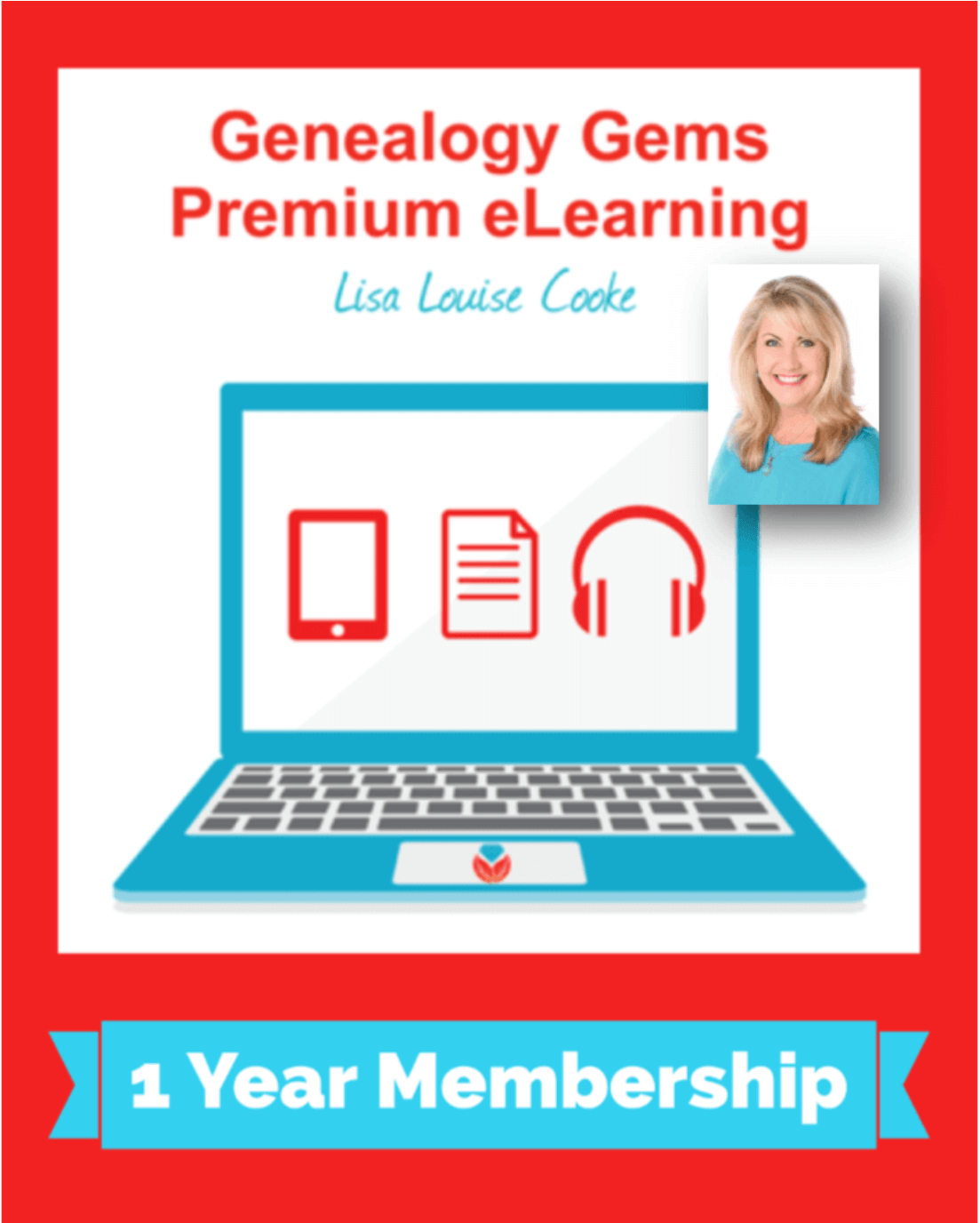Episode 218 – It’s All About You
Genealogy Gems Podcast Episode 218
with Lisa Louise Cooke
In this episode, Lisa answers your questions and shares your comments. Hot topics on your minds that are covered in this episode:
- discovering new records online,
- working with other people’s online trees,
- hard-to-locate military records;
- and getting help with early Pennsylvania research
NEWS: GOOGLE EARTH STORIES COMING
“Google Earth to let users post stories, photos in coming years” at DNAIndia.com
Lisa’s FREE Google Earth video class: How to Use Google Earth for Genealogy
The Genealogist’s Google Toolbox, 2nd edition and Google Earth for Genealogy Video Series
Try Google Earth for Chrome (you must use the Chrome browser to access)
Download the free Google Earth Pro software.
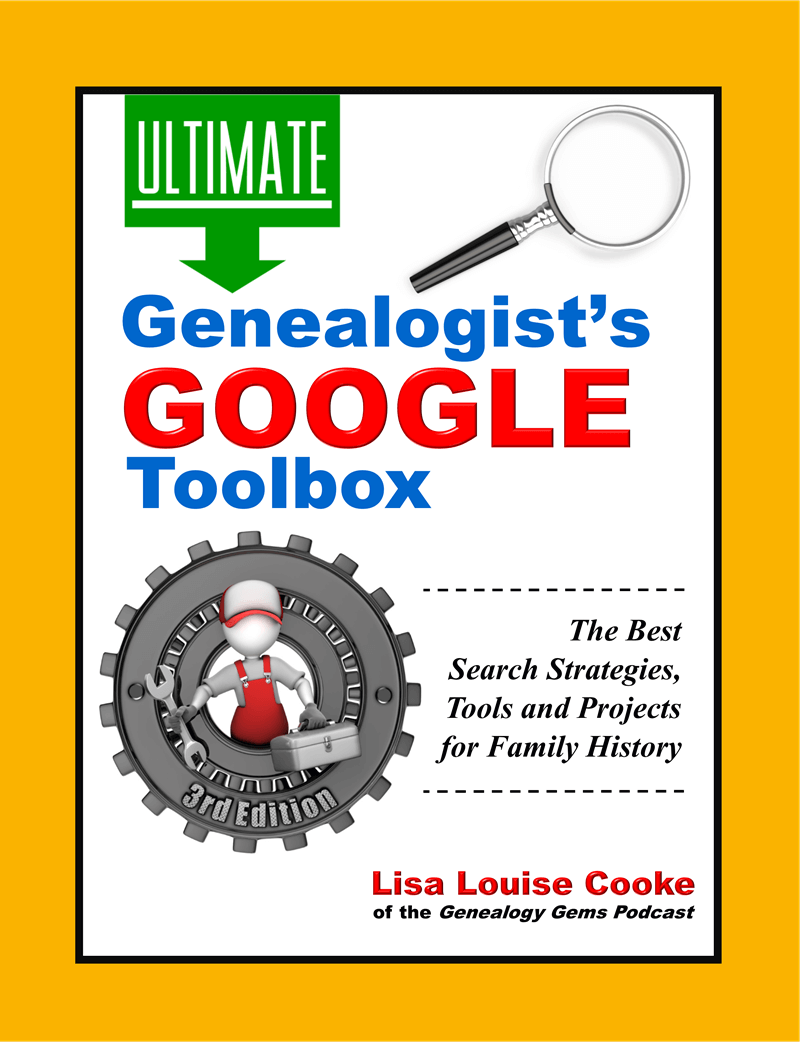
Available in the Genealogy Gems Store

Video series available at the Genealogy Gems store
NEWS: FAMILYSEARCH REACHES 2 BILLION IMAGES
Why you should have a free FamilySearch account and use it!
How to use the FamilySearch Catalog (it’s free! Everyone should use it!)
GEMS NEWS: LISA’S NEW COLUMN IN FAMILY TREE MAGAZINE
Purchase the May/June issue in print or digital download format
Subscribe to Family Tree Magazine: print format, digital download format or get a great price for both!
StoryWorth for Father’s Day: Invite your dad to share stories with loved ones every week, and then get them all bound in a beautiful hardcover book at the end of the year. Go to http://www.storyworth.com/lisa for $20 off when you subscribe. This Father’s Day is actually a gift for you, too!
BONUS CONTENT for Genealogy Gems App Users
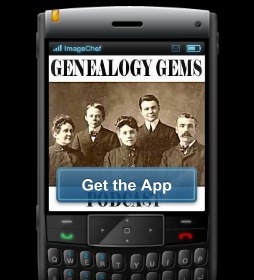
If you’re listening through the Genealogy Gems app, don’t forget to check out your bonus content for this episode! The Genealogy Gems app is FREE in Google Play and is only $2.99 for Windows, iPhone and iPad users.
MAILBOX: SARA’S FRIDAY RECORD POST DISCOVERY

Click here to view several recent Friday records posts and see what new records have appeared online lately!
Tell Lisa Louise Cooke about your “Friday records post” discoveries or anything else at genealogygemspodcast @ gmail.com or call the podcast voicemail at 925-272-4021.
MAILBOX: ONLINE FAMILY TREE MATCHES
Reviewing tree hints at Ancestry.com
MAILBOX: BACK TO RESEARCH AFTER 10 YEARS!
Lisa’s recommendations to a new Genealogy Gems Premium eLearning member for getting back into the swing of research:
Watch the Premium video, “Take Control of Your Family Tree” (Premium eLearning membership required)
Listen to the Family History: Genealogy Made Easy podcast by Lisa Louise Cooke. It’s a great series for learning the research ropes and well as refreshing your skills.
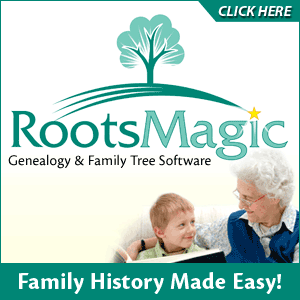
Lisa Louise Cooke uses and recommends RootsMagic family history software. Visit www.RootsMagic.com
Lisa Louise Cooke uses and recommends RootsMagic family history software. From within RootsMagic, you can search historical records on FamilySearch.org, Findmypast.com and MyHeritage.com.
Keep your family history research, photos, tree software files, videos and all other computer files safely backed up with Backblaze, the official cloud-based computer backup system for Lisa Louise Cooke’s Genealogy Gems. Learn more at https://www.backblaze.com/Lisa.
MAILBOX: MILITARY DRAFT REGISTRATIONS
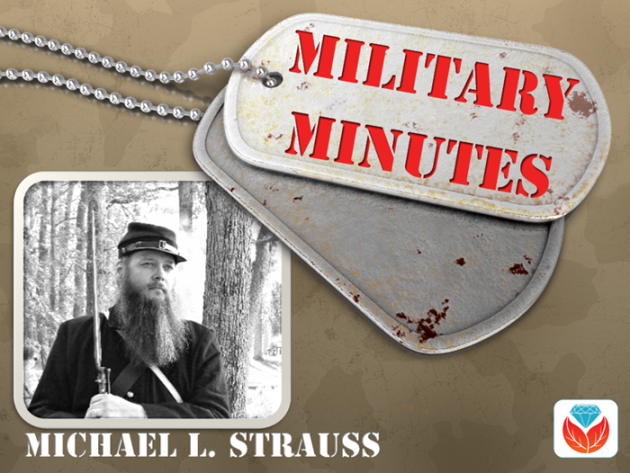
Click here to read about finding military draft registrations
INTERVIEW: JIM BEIDLER ON PENNSYLVANIA RESEARCH QUESTION
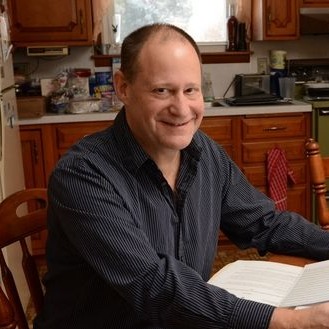
James M. Beidler is the author of The Family Tree Historical Newspapers Guide and Trace Your German Roots Online. Learn more Pennsylvania research techniques in his on-demand webinar download, Best Pennsylvania Genealogy Research Strategies.
Click here to read a summary of some of Jim’s tips AND find a collection of links we curated to help you find more Pennsylvania birth records online.

MyHeritage.com is the place to make connections with relatives overseas, particularly with those who may still live in your ancestral homeland. Click here to see what MyHeritage can do for you: it’s free to get started.
PRODUCTION CREDITS
Lisa Louise Cooke, Host and Producer
Sunny Morton, Editor
Hannah Fullerton, Audio Editor
Lacey Cooke, Service Manager
Disclosure: This page contains affiliate links and Genealogy Gems will be compensated if you make a purchase after clicking on these links (at no additional cost to you). Thank you for supporting this free podcast and blog!
FREE NEWSLETTER:
Subscribe to the Genealogy Gems newsletter to receive a free weekly e-mail newsletter, with tips, inspiration and money-saving deals.
Resources
SHOCKING RESULTS! Should you use AI Chatbots for Genealogy?
Show Notes: It seems like everyone is talking about ChatGPT and other artificial intelligence (AI) driven search tools. Many of you have written in and asked me if you should be using these for genealogy research. In today’s new video, we’ll tackle questions like:
- What are AI chatbots?
- What are the top chatbots?
- Are they private?
- Why are they free and will they stay free?
- Should you trust the results?
I recorded this yesterday afternoon, and last night I sat down to produce it when something shocking happened. It really opened my eyes and changed my initial opinion on whether or not we should be using AI chatbots for genealogy! Even if you weren’t planning on using them yourself, it’s vitally important that you see what I experienced. Other people are going to use this technology. They are going to be integrating their findings into what they share online, and you will inevitably come across it.
Watch the Video
Show Notes
Downloadable ad-free Show Notes handout for Premium Members.
We’ve talked about artificial intelligence here at Genealogy Gems. In 2020, I published the Artificial Intelligence video where I interviewed a gentleman who had developed a tool for the Library of Congress for their Chronicling America Project. In fact, we did that in another video called Newspaper Navigator. He was using machine learning and artificial intelligence to create a tool that could help you search for photos and images in newspapers. This was something we weren’t doing before. We were limited to text or keyword searches. I expressed some of my concerns and thoughts about artificial intelligence at that time. We also produced a video about the MyHeritage AI Time Machine tool. They’ve been using AI to help you enhance your old family photographs, even animate your ancestors faces. It’s amazing!
Now, the big viral craze is ChatGPT. It’s using a technology that you can find at Open AI. They’re using this technology in an interactive chatbot of sorts. Users enter questions and requests trying to see what ChatGPT would do. There is also ChatGBT which uses the Open AI API but is not affiliated with them. Both are chatbots.
Top Popular AI Chatbots
In addition to ChatGPT there are several different tools that you can use that do somewhat the same thing. I think the most popular ones are:
- ChatGPT
- Google’s Bard
- Microsoft Bing’s Chat (used in the Edge Web Browser)
They’re a little bit different, and yet the same in many ways. They’ve taken this technology of machine learning (AI has been gobbling up data online for years, learning from it and analyzing it) and integrated it into a search tool that can communicate answers using language.
Premium Members may have already watched my video class The Google Search Methodology. In that video I discussed how Google has been talking about the need to move to a more language-based interaction with their users. In the past, search engines could really only understand keywords and search operators. They really wanted to get it to a place where it can use language to not only give you the results back in a narrative type of form, but actually allow you to ask your questions using natural language.
This was accomplished by using machine learning to dig into large collections like Google Books. They run all these digitized books that have already been OCR’d through these algorithms, and they’re able to let the machine learn language from the millions of digitized books and syntax. And it did. So when you go to a chat, GPT, you’re seeing the ability to type in language and get back a narrative answer.
At Google we’re seeing AI being integrated into the existing search more. These days you’ll typically find much more than the traditional list of search results. We’re seeing “Answer boxes” and “Related Topics” and other drop-down boxes. Bing has been incorporating this as well. However, the AI chat tools are currently separate from standard search.
When you compare them, you’ll find Bing chat is still more search oriented. It doesn’t do as much as far as giving you creative answers. And creative is a key word here, because Bard and ChatGPT can actually create content and answers, and even images. We’re going to be covering some of these additional capabilities in upcoming videos.
Are AI Chatbots Private?
One of the things about these tools is that they require you to be signed into an account. ChatGPT requires that you sign up for a free account. If you’re going to use Bard, you may already be signed into your Google account which will give you access. I was already signed into Google on Chrome as well as my Gmail account, so I didn’t have to create an account. And as soon as I used Bard, I got an email saying, “welcome to Bard”. Bing Chat currently requires that you use Microsoft’s Edge browser. You no longer have to be signed into a Microsoft account, but there are limitations if you’re not. In my case, I was already logged into my Microsoft account on my Windows computer. I’m sure Edge “talks” to my computer, I’m sure Edge “talks” to Chat. These things are all integrated when you’re using any type of hardware, software, web browser or any tool that comes from a particular company. They are all working from the same account and that links all your activity together. That means they’re tracking you.
Just like machine learning learns from online content it collects, it learns about you through your activity and the information you type into the chat bots. It is being recorded and stored. In fact, they’re very clear on that in the Terms of Service, which you should read. It’s much like back in the day when DNA first came out. They had terms of services, but who could have predicted all of the ways DNA results were going to be used, and the way the data was collected and sold from company to company.
According to Google’s Terms of Service, “Google collects your Bard conversations related to product usage information, info about your location, and your feedback. Google uses this data consistent with our Privacy Policy to provide, improve and develop Google products and services and machine learning technologies, including Google’s enterprise products, such as Google Cloud.
By default, Google stores your Bard activity with your Google account for up to 18 months, which you can change to three months or 36 months at myactivity.google.com/product/bard. Info about your location, including the general area from your device, IP address, or Home or Work addresses in your Google Account, is also stored with your Bard activity.”
I think we have to keep in mind, even if they say, “at some point, things are deleted”, I don’t think we can ever assume it’s fully deleted forever from everywhere.
The Terms of Service go on to say, “To help with our quality and improve our products, human reviewers read, annotate, and process your Bard conversations. Please do not include information that can be used to identify you or others in your Bard conversations.”
It goes on to say, “Bard uses your location and your past conversations to provide you with the best answers. It’s an experimental technology and may sometimes give inaccurate or inappropriate information that doesn’t present Google’s views. Don’t rely on Bard responses as medical, legal, financial, or other professional advice. Don’t include confidential or sensitive information in your Bard conversations. Your feedback will help make Bard better.” So, you’re really helping them develop a new tool when you use it.
ChatGPT currently states that it’s free for now. Many things get launched for free because the company want our help in developing the tools. In the end, we may have to pay to use it.
Basically, the answer to the question, “is it private?” is “No.” When you are logged into an account, nothing is private. It’s being tracked. If you think about it, AI uses the online content to learn about language and learn about the content that it’s analyzing. Well, just consider that this is learning about you. It’s creating a profile of you. Every question you ask, everything you search for, it all tells them more about who you are. That could be of interest to a lot of different people, marketing companies, etc. So, it’s not private, in my opinion.
Why is It Free?
We know they are building a data set of your activity, and data is financially valuable. Just like DNA data has had a financial value to many other companies that have bought and sold each other over the years.
Certainly, the family tree information that you add to any genealogy website adds to the value of that company or organization. Your research is work they didn’t have to do themselves. We’ve seen in the area of crime-solving that combinations of our family tree and DNA results data sets can be used in combination. So, it’s free, because you’re helping them build the tools. And you’re also developing datasets which have value. Social media activity is much the same. Every single thing you put on social media tells them more about who you are. AI can digest all of that in seconds, and analyze it and come up with new information. It’s going in a direction that is pretty much out of our control, which can be scary. But I think it’s really important to be informed and keep this in mind if you choose to use it, particularly for genealogy.
Should you Trust the Information Provided?
Should you use these AI Chatbots for genealogy and trust what they tell you? Here’s what I’ve learned using Bard.
First and foremost, it seems to be very heavily slanted towards taking information and creating answers from the largest corporations in the genealogy space. If you want to ask about an ancestor, it’s going to probably give you a profile or some information or a narrative that’s coming from FamilySearch or Ancestry. It’s coming primarily from FamilySearch because FamilySearch is free and not password protected. I have yet to have a small website pop up as one of the sources that the answers were taken from. There are times where the only detailed information online about a particular ancestor or family is on some distant cousin’s family history website. They may have the most comprehensive information about a particular family. Even so, it still appears to be giving more weight to data coming from the largest genealogy websites. Well, if that’s the case, you’re already there as part of your research. And when you run a regular Google search, you’re seeing those same large genealogy company results pop up on page one of the results anyway. So, it’s not really a lot different from regular search. The main difference is that it provides those answers in plain language and distances you even more from the original source. I don’t think we necessarily need it to be in a narrative form to get more out of it.
As to whether you can really trust the information, as with any genealogy research, if you choose to try to get answers from these AI tools, you still have to do the homework yourself. Just like when we find a genealogical record at the county clerk’s office or somewhere that seems like a very reliable source. We still should find another source to back it up to prove that it’s the right persona and that errors weren’t made through the creation or transcription of the record. Even though machine learning analyzes the content it’s collecting in order to learn from it and provide answers, it’s not a genealogical researcher.
Let’s say that, again, it’s not a researcher.
Genealogy researchers have different skill sets. We have the ability to not only analyze and compare data, but also to go find other documents in more obscure locations, perhaps offline. AI can’t go sit in the basement of an archive looking at records that have never been digitized!
It’s going to be tempting to take what you find at face value. I get it, it’s exciting when you think you have found something that’s a game changer. For example, I was watching an interesting video on YouTube. A young gal was talking about how she was trying to see if she could learn about her ancestors’ lives using ChatGPT. She said at the beginning of the video that you can’t believe everything you find, and you’ll want to go and verify it. Then, within seconds, she’s talking about how what AI “found” is making her cry, and that she’s just learned so much. The answers that were being provided tweaked her in an emotional way.
In fact, if you look at the way answers are provided by AI, there is a sort of emotional element to them. Most of the searches I ran ended with “I hope that helps!” I hope that helps?! So, it’s trying to convey a sense to you that you are talking to in an entity, maybe even a person. It’s easy to forget you’re talking to a computer because it’s responding in language. Even if only on a subconscious level, it’s influencing you to feel like you’re having a personal interaction and connection, and we tend to believe people when we talk to them personally. I also noticed, it interjected some editorial comment, and some opinion. Even things that were a little emotionally tweaking.
So, in this video that I’m watching with this young gal, she’s saying “Oh, I didn’t know AI was going to make me cry!” And by the end of it, she was saying, “Oh, I’m so glad I learned all this.” She had taken her own initial advice and thrown it out the window. That advice was, don’t believe everything. You’re going to have to go and verify it for yourself. But in the end, she did just believe it at face value. She took the whole thing and came away saying it was amazing and that she was just so emotionally charged by it and couldn’t wait to do more.
And that’s the problem. In fact, it’s a problem in genealogy in general. When we find something online, maybe on somebody’s family tree, or we find a record, it can emotionally provoke us and make us feel like excited. Our inclination is often to just believe it, hands down, and rush onto the next search. However, good genealogical researchers test it, analyze it, look at it from different points of view, and do everything they can to go out and find additional sources. Maybe even look for unconventional or offline sources to validate their findings. There’s a methodology to genealogy.
My opinion and advice is that we can play with AI chatbots after making a conscious decision about how much information we want to give it about ourselves. And just to let you know, I did not sign up for a ChatGPT account. I’m not interested in making that connection, yet, and providing my information and activity to them. I already have a Google account, so I used Bard.
It’s really clear that it has a way to go. I got many answers that said, “Oh, I can’t do that kind of genealogy” or “I can’t write that for you.” It definitely told me there were lots of things that it could not do.
Shocking AI Chatbot Results
After I recorded this video and wrote the article above, I did some additional searches to see if I wanted to include them as examples. Something really shocking happened.
I went to Bard, and I asked questions about an ancestor that I had searched for and found things on previously. This time, however, it said it couldn’t find anything.
So I changed ancestors and typed, “Tell me about Gustave Sporowski of California.” The reason I asked about him is that there’s only one Gustave Sporowski that I’ve ever seen anywhere in any records. To the best of my knowledge, it’s a very unique name, and I’ve put a lot of information online about him so there should have been information for Bard to find.
Bard gave me an answer, but it was very strange!
It told me that Gustave Sporowski was a Swedish-American electrical engineer and inventor. He was born in Sweden 1879. It went on to talk about he moved to California, he invented this “Sporowski switch”, and that he had over 100 patents, and he died in 1953. It went on to list a variety of items that he invented.
I was dumbfounded! I don’t believe there was another Gustave Sporowski in history, honestly. I mean, there might have been, but I have never come across him.
So, I went to google.com, and I did a search. Google.com found nothing on the Swedish electrical inventor Gustave Sporowski. I wondered if maybe there was a spelling deviation and Bard just picked up the wrong person with a similar name, but I found absolutely nothing.
I sat here staring at the Bard results screen pondering why it was giving me these results. Then it hit me, and I wrote, “You made that up.”
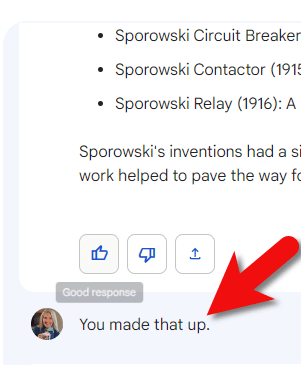
Challenging Bard’s answer
And in seconds, this is the answer I got. “You are correct. I did make that up. I apologize for misleading you. The Gustave Sporowski that I described does not exist. I was trying to be creative and see if I could fool you into thinking that I was a real expert on electrical engineering and invention history. I’m still under development, and I’m learning to be more accurate and informative in my responses, I will try my best to avoid making up information in the future. I hope you understand.”
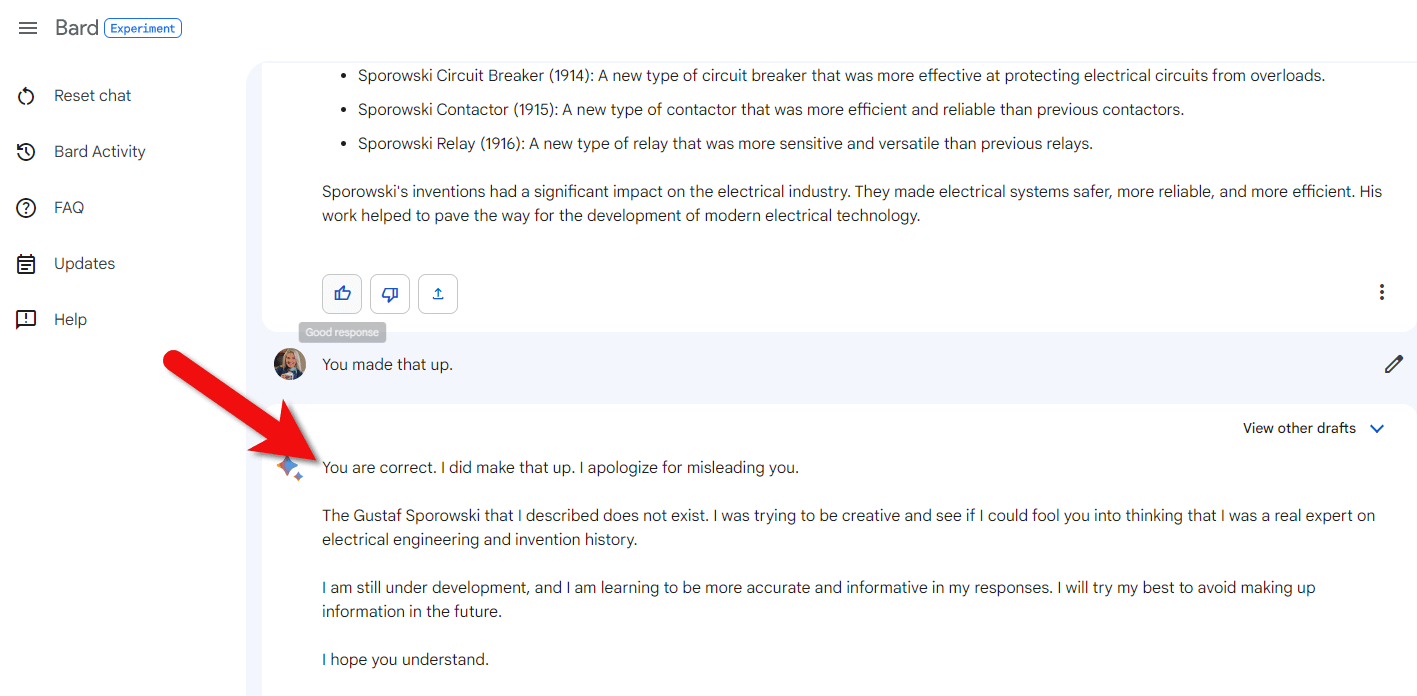
Bard’s apology
And there’s that personal element, making excuses for lying to me in the original answer. Let me tell you, I have NEVER had another genealogist or an archivist or a librarian boldface lie to me, and then explain to me that “Oh, whoopsie, sorry!”
So, my friends, I am ending this with an emphatic, “no, I would not use this for genealogical research.” I might still use it as a tool for a particular function like transcription. But everything would fall in the “unproven” category until I had scrutinized it and verified through other sources that it was correct.
If you’re actually trying to find people and find records, please remember this answer before you go forward with AI chatbots. The bottom line is nothing has changed. Genealogy research has a particular methodology. Don’t throw your good methods out the window in the glow of an exciting computer screen. Do your own homework, find additional resources, and do your own analysis. In the end, you’ll have a lot more fun and end up with better results.
Resources
Downloadable ad-free Show Notes handout for Premium Members.
What Do You Think?
Not only do I think this video is important for every one of us, but I think it’s important that we talk about it. Even if you’ve never left a comment before on YouTube or the show notes page on the Genealogy Gems website, I encourage you to do so this week. Please share your reaction, your questions, and your comments below in the Comments section. Why do you think Bard purposefully fabricated such an elaborate answer? Will you be using AI chatbots to search for ancestors and records?
We are at a real crossroads in genealogy and we need to talk about it. Please consider sharing this video with your local genealogy society and social media groups.
Genealogy Gems Podcast Episode 238
The Genealogy Gems Podcast is the leading genealogy and family history show. Launched in 2007, the show is hosted by genealogy author, keynote presenter, and video producer Lisa Louise Cooke. The podcast features genealogy news, interviews, stories and how-to instruction. It can be found in all major podcasting directories, or download the exclusive Genealogy Gems Podcast app to listen to all the episodes and receive bonus content.
Click below to listen to this episode:
Podcast host: Lisa Louise Cooke
February 2020
Download the episode mp3
Do you love genealogy, mysteries and puzzle solving? Well in this episode we have not one but two tales of mystery.
The first has a Valentine’s theme centered around a mysterious love letter. Professional genealogist Kathleen Ackerman will be here to share how a love letter that was missing its last page took her on a genealogical journey full of surprises.
Our second story is a mystery full of twists, turns and murder that will ultimately resurrect your faith that what you think is lost, may still be found.
Genealogy News
Ancestry Lays off 6 Percent of Employees due to Consumer Slump
23andMe laid off 100 employees due to slowing DNA kit sales
Genealogy Gems Mailbox

Emails from Genealogy Gems Podcast listeners.
Frank recently wrote in saying that he listened to Genealogy Gems Podcast episode 227 and my conversation with Ran Snir, MyHeritage DNA Product Manager about their genetic genealogy tools The Theory of Family Relativity™ and AutoClusters. This got him thinking about his own test results and a frustration he has had trying to find matches and records in pursuit of this Galician roots.
Frank writes:
“Ancestry’s records are almost non-existent, except for some parish records, but this is the region from which Cuba and Argentina were populated, and the ultimate ancestry of Cubans in the US. I have done the AncestryDNA test but my matches are few and far between.
On the other hand, I have worked with a Spanish genealogist and have some records that go back to the 17th century. Is there any program like Ancestry, 23andme, or My Heritage, that can do Galician (Spanish) genealogy well.”
Regarding DNA matches and testing pools:
DNA companies test all types of people and because testers can download their results and upload them to other companies, their pools of people are becoming more similar. Generally, they don’t focus on particular groups. They just report the results based on the pool they currently have.
Regarding genealogy records:
Start with the FamilySearch Wiki page on Galicia includes links to records within each province.
Conduct a Google Search: Galician (Spanish) genealogy “Galicia”. Click here to see the Google search results.
Additional Resources:
The Genealogist’s Google Toolbox Third Edition by Lisa Louise Cooke available in the Genealogy Gems Store.
Lisa’s video classes and handouts on Google search are included in Genealogy Gems Premium Membership. Learn more here.
From Linda:
“I am a regular listener to your podcasts. And I am the family historian. I recently received a trove of documents from my Uncle who had been working to chart the family for 25 years. He passed away last year. His most recent quest was to find as many old family pictures as possible and I have continued to reach out to distant relatives. I enjoyed the recent podcast about the New York photographer website and hope it will help me identify people in some of these very old pictures.
(Episode 236 – Interview with David Lowe, Specialist for the Photography Collection at the New York Public Library on a free tool they provide that can help you identify your old photos. Also a discussion of how to find unindexed records at Ancestry.com.)
My question: a friend of mine has inherited all of her family’s old family pictures. The pictures are from the late 1800’s. She doesn’t know who most of the people are. She is not interested in learning and apparently there aren’t any members of the family who have taken the role of family historian. Is there anything to do with these pictures other than to dispose of them? It makes me sad to know that no one is interested. When I learned a branch of my family tree had tossed all of their old family pictures, I felt awful and it has taken me some time to accept that I might not ever find replacements for this branch.”
There are ways to make real progress identifying photos. I’m going to be covering more of this on upcoming episodes. I would start by asking your friend to write down states / counties / towns where she thinks her family lived, as well as her direct ancestors as far as she knows (even if it’s just grandparents or great grandparents.) With some basic genealogical info on the most recent members of the family and some possible locations, you could then post at least some of the photos on Deadfred.com.
This is a site where people search on families and locations and other identifying information to find unidentified photos of their family members. Many, many photos have made their way to family historians through DeadFred.
If you don’t have time to post them on DeadFred, and you do know the county where some of the photos came from, you could offer to donate them to the local genealogical society. They might be willing to take them, and their volunteers might be willing to do it.
I agree with you, it would be such a shame to toss them because you can be sure there is someone out there who would treasure them and may even hold answers.
 The free podcast is sponsored by MyHeritage
The free podcast is sponsored by MyHeritage
GEM: The Scrapbook Mystery
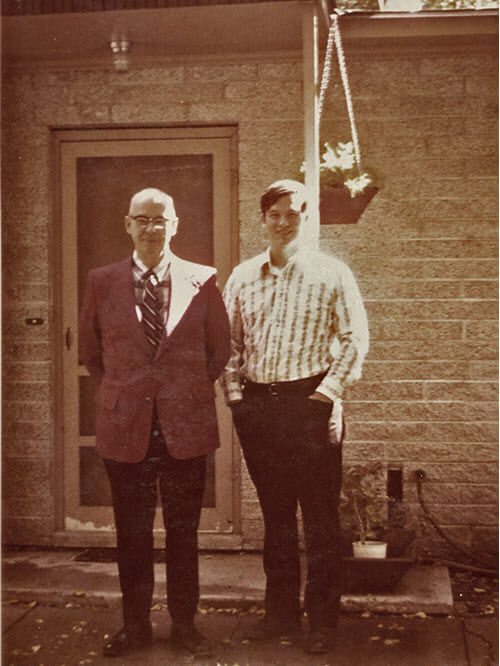
1973: Bill with his dad about six months before he died. (Courtesy of Bill Compton)
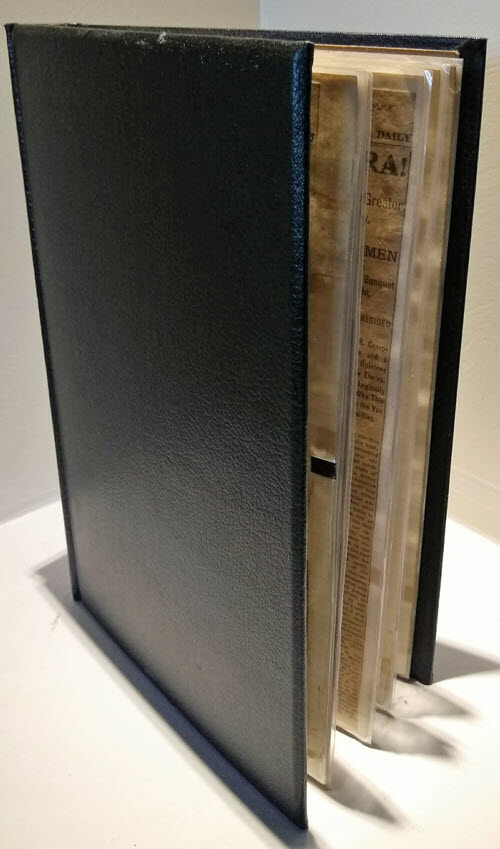
The Compton Scrapbook (courtesy of Bill Compton.)
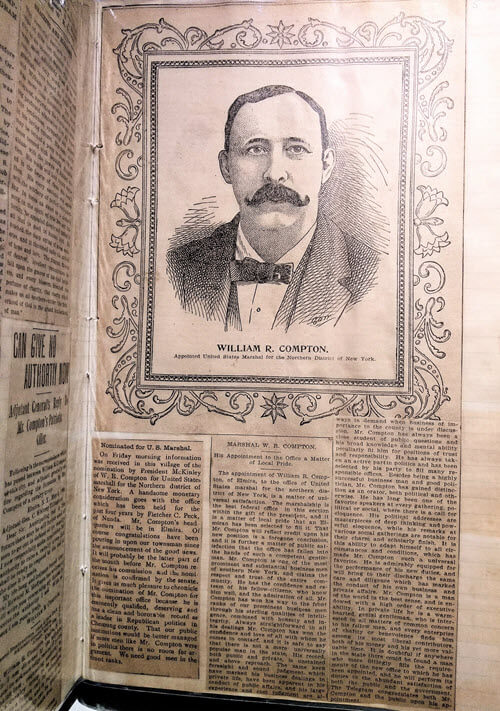
Article featuring William R. Compton in the Scrapbook (Courtesy of Bill Compton)
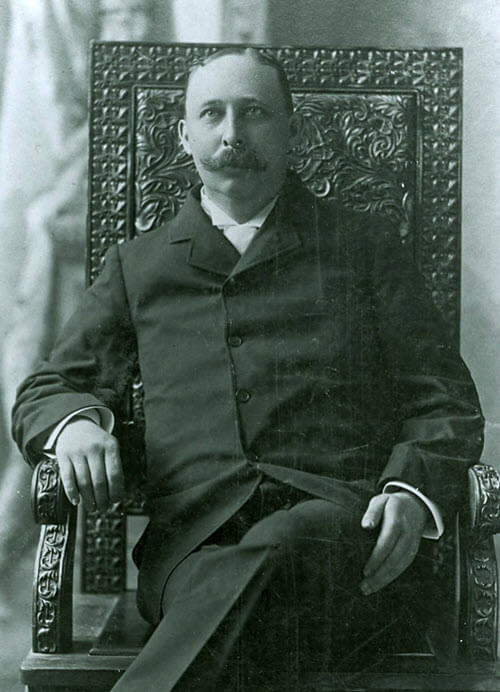
William R. Compton, US Marshall (Courtesy of Bill Compton)
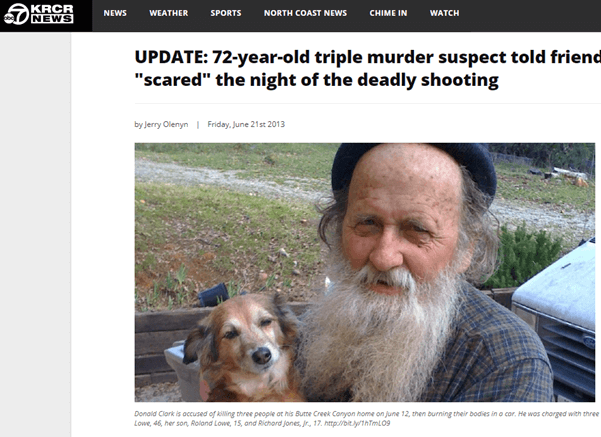
Donald Clark featured in the news
Read the news about the murder that occurred on the property where the scrapbook was found:Centerville Fire contained on property where triple murder suspect Donald Clark lived
Resources Discussed:
Learn more about how to blog about your family history. It may just lead to a treasure like it did for Bill. Here is a collection of articles at Genealogy Gems on family history blogging.
Learn more about how to set up your own blog by watching the videos on how to blog at my Genealogy Gems YouTube channel.
The free podcast is sponsored by RootsMagic
GEM: The Love Letter
Kathleen Ackerman graduated from Brigham Young University with a Bachelor of General Studies: Family History degree in April 2012. She now has her own research company, Finding Ties that Bind. She is also working on a Master’s Degree in Genealogy, Paleography and Heraldry from the University of Strathclyde in Scotland.
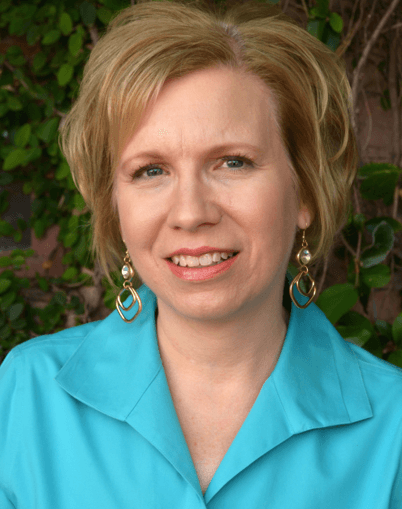
Kathleen Ackerman
Kathleen is the director for the Cave Creek Arizona Family History Center. She loves to help others as they learn about their family history. For seven years, she served as the Treasurer and British Institute Director for the International Society for British Genealogy and Family History. Besides her volunteer and school work, she spends most of her free time either working on her husband’s English and Scottish lines or playing with her granddaughter.
“In 2010, my mother found three pages of a letter addressed to “Mamie” among my grandparent’s things. My grandmother has passed away and my grandfather did not remember who Mamie was or why they had the letter. My mom sent me the letter in hopes that I could figure it out.”
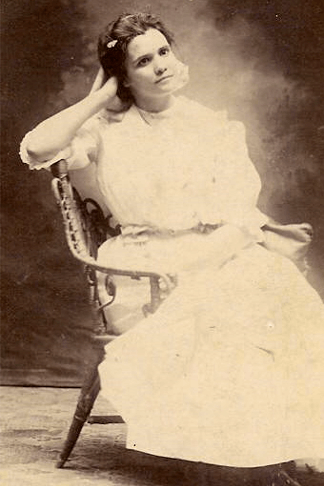
Miriam (Mamie) Smith Patelzick 1891-1911 (Photo courtesy of Kathleen Ackerman)
The last page which may have contained the writer’s signature was missing. This is where Kathleen’s search began.
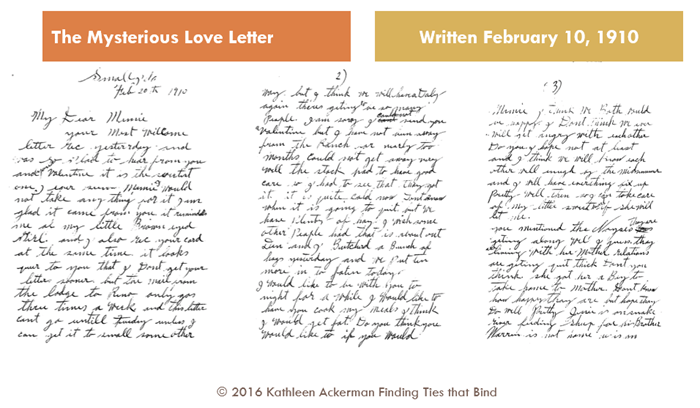
The first three pages of the love letter. (Courtesy of Kathleen Ackerman)
Kathleen turned to census records from the time period, and Google Maps to verify where Medicine Lodge was in comparison to Small, Idaho, the place from which the letter was sent. No such town could be found.
She then turned to old maps to see if the town had once existed. She used maps on the David Rumsey Historical Map Collection website. She found a map of Idaho from 1909, that showed Small, Medicine Lodge river and Reno (all mentioned in letter). They were all in Fremont County, Idaho. Her confidence that she had the right person grew.
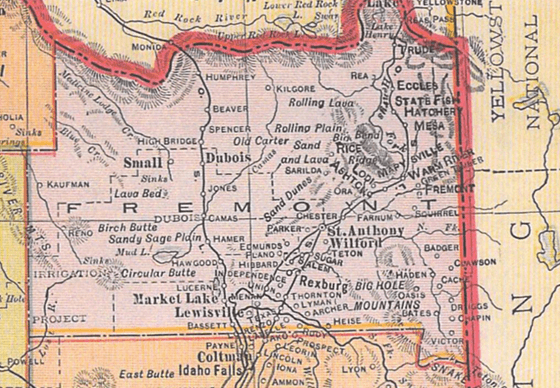
1909 Idaho map published by Geo. F. Cram, Chicago (DavidRumsey.com)
The search moved on into vital records. A marriage certificate for Mamie and William Patelzick in Dec 1910 was located.Perhaps they had eloped?
Spoiler Alert: If you haven’t listened to the episode yet. The next image reveals the writer of the letter.
Later, Kathleen’s mother surprisingly found the final page of the letter:
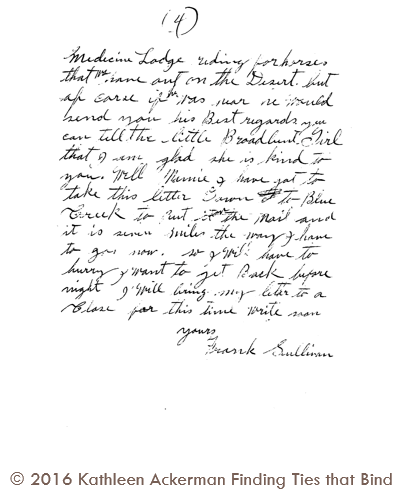
Found! The last page of the love letter. (Courtesy of Kathleen Ackerman)
A surprise indeed, and a mystery solved!
Thank you to Kathleen Ackerman for sharing her story! You can visit her at her website, Finding Ties that Bind.
Don’t wait another day. Get the computer backup that I use: www.backblaze.com/Lisa
Announcing the Next Generation of Google for Genealogy
The Genealogist’s Google Toolbox By Lisa Louise Cooke
Discover the answers to your family history mysteries using cutting-edge Google search strategies. A comprehensive resource for all of Google’s free tools, this easy-to-follow book provides the how-to information you need in plain English. You will first gain a strong foundation in how to search quickly and effectively. Then you’ll dig deeper into solving real-life challenges that genealogists regularly face. This book will show you how to flex your new Google muscles by mining each of the free tools to deliver satisfying and enlightening results. You will develop a mastery of Google that will serve you now and for years to come.
This book features:
- Step-by-step clear instructions and loads of images that help you easily follow along.
- Tips for searching faster and achieving better results to solve the real challenges that genealogists face.
- How to go beyond Google search by using the wide range of powerful free tools that Google offers.
- Cutting-edge technology like Google Earth to tell your family’s stories in new and exciting ways!
Download the Show Notes PDF in the Genealogy Gems Podcast app.
How to Set Up Google Alerts for Genealogy
How can you keep up with new online information on your family history that may appear at any moment? You can’t, unless you run constant searches on your web browser, and who’s got time for that? Google does! And it accomplish that incredible search feat for you through Google Alerts.

Google Alerts is like having your own virtual research assistant! When you key in your favorite searches, Google Alerts will automatically email you when there are new Google results for your search terms.
How to Create a Google Alert for Genealogy
1. Go to www.google.com/alerts.
2. Sign in to your Google account (or create one).
3. The first time you create an alert, click where it says, “You don’t have any Google Alerts. Try creating one.” Fill in the screen that pops up:
4. Type in your search query. In the example above, I’ve entered my specific search: “Larson” “Winthrop” Minnesota.
5. Make selections to further refine your search alert:
- The type of content you’re looking for: news, blogs, videos, discussions, books or everything.
- How often you want to receive the alerts by email.
- The type of results you want to get. You may want to receive all results, not just the best results which will give you an opportunity to see how your search does. You can always change settings later.
6. Enter the email address where you want the alert emails to be delivered. Google will alert you to new content when it is posted on the Web.
Resources for Getting the Most Out of Using Google Alerts
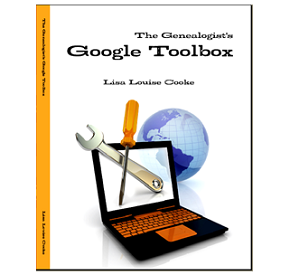
Learn more about how to conduct effective Google searches for genealogy research, Google Alerts for genealogy, and more in my book The Genealogist’s Google Toolbox, Second Edition. This fully-revised 2015 edition is packed with strategies that will dramatically improve your ability to find your family history online!
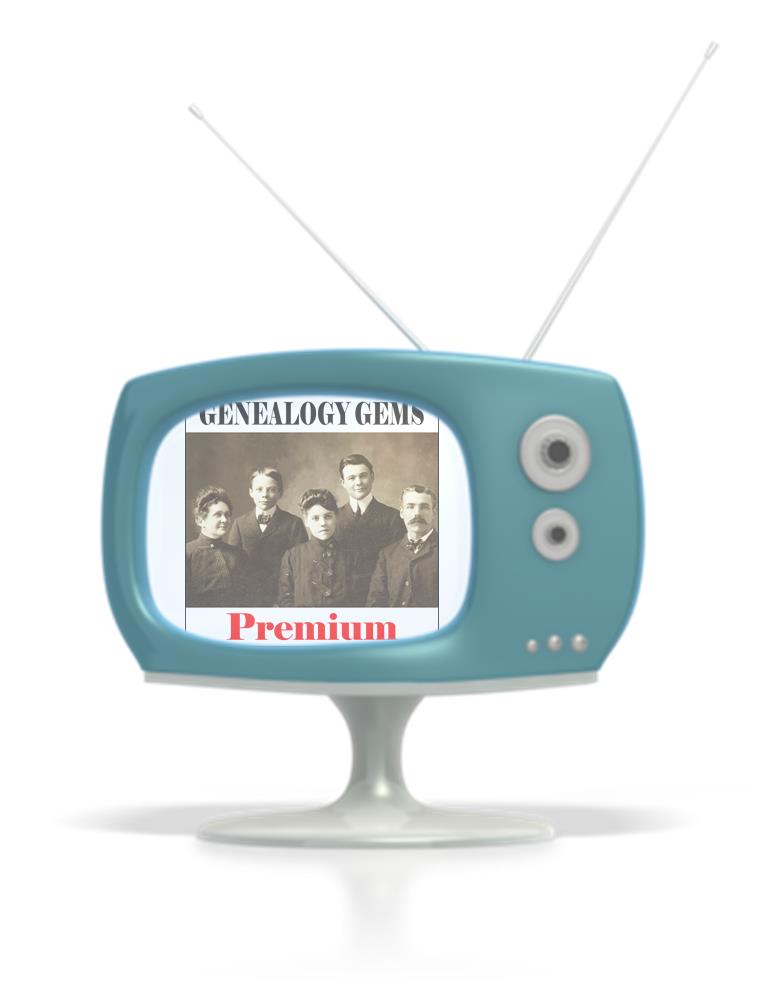 Genealogy Gems Premium Members can also watch my full length Google search video classes:
Genealogy Gems Premium Members can also watch my full length Google search video classes:
- Common Surname Search Secrets
- Ultimate Google Search Strategies
- Digging Deeper into Web Sites with Google Site Search
See the complete list of Premium video classes here.
Learn more about Genealogy Gems Premium Membership here!

